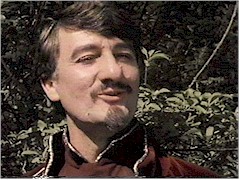
|
Count Grendel |
Reviews

|
Count Grendel |
"Ha-Ya, Beast!" by Stephen Maslin 9/2/15
Once upon a time, television was a distinctive medium: a half-way house between live theatre and cinema, neither one nor the other, but if anything closer to theatre. As such, it had actors acting in a very different way from today. Just as you saw TV comedians who had honed their craft in live performance before making it onto our screens, you saw actors who had plied their trade in repertory theatre before taking the sideward step to telly. Sadly, since the late twentieth century, television has come more and more to ape cinema, specifically Hollywood cinema, thus becoming more about spectacle and more of a director's medium. The skill of actors has been slowly downgraded in favor of digital fireworks; the beauty of the spoken word sacrificed in favor of momentous events and obvious emotions. We have in this process lost something unique: a specifically televisual narrative art, two essential ingredients of which were (or at least should have been) an actor's ability to hold an invisible audience and a willing suspension of disbelief by all concerned.
"Are there many creatures like that around here?"
Though TV's former self is never going to come back, it is one of the main reasons why Doctor Who of the classic vintage (and other British television of the 1960s, 70s and perhaps even early 80s) can still cast a spell. An enduring tragedy of Doctor Who from those far-off times, specifically the latter half of the 1970s, is that one of its finest antagonists - played by an actor perfectly suited to this lost art - should forever be associated with one of its worst. Count Grendel of Gracht in The Androids of Tara will sadly never be accorded the accolades that the character and its portrayal deserve because he had, however briefly, to share the stage with one of Doctor Who's most poorly realized monsters.
"I understood that the fauna of Tara were supposed to be friendly."
Count Grendel is the Who villain par excellence: the result of a perfect marriage of David Fisher's sparkling script and Peter Jeffrey's superb performance, backed by some of Dudley Simpson's best music for the show and facing off against Tom Baker at his most appealing. Yet before we see Grendel on screen at all, up pops that bloody Taran Wood Beast. Even allowing for time and budget restraints, there is simply no excuse for a monster being that bad. Anyone watching who might have been drawn into the story (upon first broadcast, and most certainly post-Rose) would have already unconsciously filed the whole thing under 'shoddy' before Grendel shows up. Even though 'shoddy' is a description that the story very soon shrugs off, first impressions are lasting impressions. The damage remains done. How can one expect to keep an audience when something so crappy happens so early on?
"I always keep some beasts in my woods to hunt..."
My favorite theory about the Taran Wood Beast is that it is actually meant to be a man in an unconvincing suit and Halloween mask; that the manager of Count Grendel's estates thought that a real Taran Wood Beast would be far too dangerous to have clambering up and down the hillsides of his master's lands and that it would be better to have some drunken peasant (or Ray Lavender) dressed up to look like one. If that peasant were to have an 'accident' in the course of his duty, another could easily be found, whereas replacing a real Taran Wood Beast in such circumstances would be extremely expensive. Grendel, no fool he, was never under any doubt that the his pet Wood Beasts were fake. Yet he went along with the deception, too well-bred to shatter the illusions of lesser mortals and secretly relieved at not having to risk his neck hunting something so ferocious. Besides, teaching peasants a lesson was what Grendel did best.
"...but they don't usually attack people unless they're frightened in some way."
It is rare to have any 70s Doctor Who guest artiste match Tom Baker for sheer magnetism (other contenders being Beatrix Lehmann as Professor Rumford, Iain Cuthbertson as Garron, Tony Beckley as Harrison Chase, John Woodnutt as the Duke of Forgyll) but Peter Jeffrey does it with ease. No one after him came close. So if you know someone who has yet to see The Androids of Tara, or has got as far as the Wood Beast and understandably given up, please urge them to persevere BUT make sure you warn any first-timers that something decidedly substandard happens early on in part one. Taran Wood Beast aside, The Androids of Tara deserves to be much more widely known. It is an almost perfect piece of family television, not because it tries to impress us but because it seeks to entertain us (and succeeds). Count Grendel is just the kind of memorable, not-quite-over-the-top villain that such a show needs, and done so well that it gave Tom Baker a reason to raise his game.
AFTERTHOUGHT
During his long career, Peter Jeffrey was a popular choice for a certain kind of role: urbane, sophisticated, patrician. He is, of course, also known to Doctor Who fans as the Colony Pilot in The Macra Terror but there are a couple of film roles that you might like to check out too: as the Headmaster in Lindsay Anderson's 'If' and as the Ottoman Sultan Mahmud I in Terry Gilliam's 'The Adventures of Baron Munchausen'. Both well worth your time.